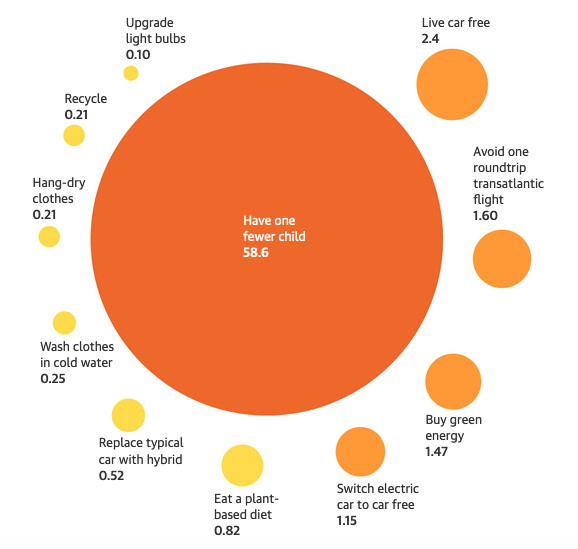Item Link: Access the Resource
Date of Publication: August 4
Year of Publication: 2022
Publisher: Roundtable
Author(s): Carter Dillard
Misleading Study from Leeds University and the IPCC: Don’t Get Scammed by Deceptive Reports on Climate Solutions
A recent study conducted by scientists the University of Leeds, and reporting about the study at The Conversation, and other places, misleads readers regarding effective solutions to the climate crisis. The benefits of the advice are being undone – and have since it was published – by a variable they intentionally ignore.
The study and reporting lists a variety individual actions one can take to reduce emissions, referring to them as the most effective. The list does not include any reference to the most effective individual action possible – choosing to have a smaller family. Yale University provides a great backgrounder here on why it’s the key move. In fact, many Nobel Laureates have called for a renewed focus on population given the crisis: Nobel laureates: population growth a major threat | Population Matters.
The Leeds study omits this issue entirely.

Taking family reforms off the list is dangerous, protecting concentrations of wealth and power who would be subject to the unique peremptory – or property-rights overriding – nature of such reforms. It also creates space for those who want to target women’s right to choose – like those proposing that we start to tax women for being childless. If the number of consumers does not matter for the climate, such proposals become more feasible.
In response to a request for correction researcher Max Callaghan said that the decision to have children was not included because it is “intensely personal.”
And hey, yes, it feels, and in many ways is, deeply personal. But it’s also deeply interpersonal, especially in these times of climate change and planetary overshoot, where resources don’t grow to match the demands of each new net child born. The study is a crucial chance to change the mindset and to help others see having kids as impacting interests beyond the parents. Ignoring that interpersonal impact is what fundamentally drove the climate crisis and is undoing the climate benefits of the purchasing changes Max and others promote.
Max also argued that:
“If we have no double counting between footprint-bearers of the same type, then we can say something sensible about the remaining carbon budgets and how these can be distributed between individuals. But if the footprints of individuals contain the footprints of other individuals, then we can no longer meaningfully talk about what constitutes a ‘fair share,’ or what levels of individual emissions are in line with the goals enshrined in the Paris agreement, for example”.
The response is obvious:
People need the information the study purports to give in order to change behavior. Because the list is incomplete some readers will be undoing the benefits produced by those engaged in buying and consumption changes. By omitting the multiplier (which is conceptually impossible), the whole point of the information becomes lost. Dividing up “remaining carbon budgets” between generations is a highly theoretical enterprise that will have little to no practical impact. Clearly explaining current people’s biggest possibilities for limiting their personal carbon emissions, on the other hand, is useful practical information. Providing it trumps the intellectual exercises around dividing intergenerational carbon budgets.
The choices around having children impacts their resilience and ability to respond to the crisis, social relations that impact societal capacities (like democracy) to respond to the crisis, and a host of other ecological impacts that go beyond but intersect with the climate crisis: Reframing Population and Family Planning to Focus on Justice – MAHB (stanford.edu) None of the listed changes in the study and articles have the multilateral impacts family planning based on the Children’s Convention would have, for example.
How can you be compensated for the harms stemming from misinformation about the climate crisis?
This goes back to Max’s claim about the “deeply personal” nature of having children. That’s a lie that’s been told, historically, to protect concentrations of (largely white) wealth and privilege from having to pay a fair share to ensure all children birth and development conditions that ensure equal opportunities in life. We have a right to take those resources from the wealthy for that purpose, and because having children is existential in nature and preceding the processes of government, we may do so by all means effective.
Article reproduced with permission.


